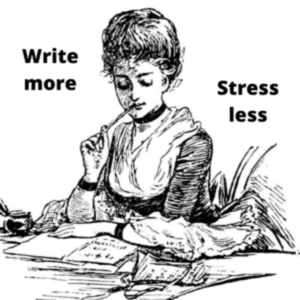I believe all writers have an inner critic, also known as Resistance and the inner troll, which does its best to sabotage your writing. Getting past that inner critic is crucial to your writing success and happiness.
Today’s Words of Wisdom looks at outwitting the inner critic, how to attain flow state when you write more (take that, inner critic!), and how to overcome demoralization which happens to many writers for a variety of reasons, with excerpts from insightful posts by Joe Moore, Brad Morrison and James Scott Bell.

In an experiment, scientists measured the brain activity of jazz musicians as they performed a memorized piece of music, and then measured it again when the musicians did an improvised piece. Different brain regions lit up, according to the type of performance being given. During the improvisation, the medial prefrontal cortex–the part of the brain that allows self-expression–was more active. During the memorized piece, the dorsolateral prefrontal and lateral orbital regions–the brain areas that monitor and correct performance–were more active.
In other words, in order to be creative, we’ve got to silence our brain’s inner critic.
For a writer, it’s not always easy to silence an internal critic. Take me, for example. I’m perfectly capable of stalling for days over a single paragraph, even a particular sentence. I’ll rewrite and rethink, tweak and prune, until I’m practically clawing at the walls of our house.
Recently I’ve developed a coping strategy for my internal critic, which I’ve named Harpy Harriet. When Harpy starts whispering in my ear, telling me things like, “Man, your writing sucks. You suck. Whatever made you think you were a decent writer?”, I merely type a little placeholder, and move on. Inevitably, when I return to that spot after having forged ahead in the manuscript, it’s much easier to write the revision.
But Harpy is a sly, cunning opponent, always scheming to get the better of me. She keeps changing tactics. Recently she’s tried to convince me that my medical issues have done a Flowers For Algernon number on the creative parts of my brain, rendering it incapable of producing decent prose. The only way I’ve been able to reassure myself is by going to my critique group. My group members don’t know anything about Harpy–they just tell it like it is about my prose. And so far, everything seems normal. I’m not like Charlie, regressing to a creative IQ of 68. I’m okay (at least as far as the writing is concerned). I can tell Harpy to take a hike.
Joe Moore—January 25, 2011
Flow is a concept first proposed by psychologist Mihaly Csikszentmihalyi. Flow describes a state of euphoria and intense focus that is achieved when you are fully immersed in the task at hand. You tune out the world because you’re so absorbed in what you’re doing. For me it’s easy to remember times when I was reading a good book or playing an immersive video game and my wife had to call my name several times before I could pull myself out of the experience. It was like I was really there. I was in flow.
Writing can produce the same experience for me, but it’s more challenging to produce the flow state. However, when it happens, it’s a sweet feeling. For musicians it’s called being “in the groove.” Athletes talk about being “in the zone.” You’re in the flow state when you’re teetering on the edge of competency, when your ability is perfectly matched to the challenge.
Flow has three prerequisites:
1) The goals must be clear. – I think this is why it’s so hard for writers to get started on a book. My characters’ goals aren’t clear to me at the beginning, so it’s hard for me to write down what’s happening to them. On the other hand, at the end of the book I usually get in the flow and write very quickly because I know where the characters are going.
2) The feedback must be immediate and clear. – I’m also a stage actor, and the feedback when I’m performing couldn’t be more immediate. You can sense how an audience is perceiving you, particularly with a comedy. But with writing the only feedback we get is from our editors and online reviewers days, months, or years after we’ve typed the last word. That’s why the feedback writers require to continue is not the readers’ kudos, but their internal drive to find out what happens in their own story. I often hear that concept expressed as someone’s “need” to write.
3) You should have the proper balance between the perceived high challenge of the task and your perception that you have the high skills to complete the task. – This prerequisite could be the problem for many new writers; the challenge often exceeds the perceived skill level for a newbie. Writing a 100,000-word novel is a daunting task if you’ve never done it before. That’s why I think in terms of scenes instead of a whole book when I’m actually writing. If I know what’s happening in that one scene, I can get in the flow.
It’s not surprising to hear that the list of character traits Csikszentmihalyi lists as most important for achieving flow are the traits you’d expect to find in successful writers: curiosity, persistence, low self-centeredness, and a high rate of performing activities for intrinsic reasons only.
If you can find the flow when you are writing, you probably won’t have any problem producing novels. The key is setting up your environment so that you minimize distractions that will keep you from entering the flow state. Checking email and Facebook will take you out of flow, so turn those apps off or write somewhere where you can’t access them. And I highly recommend listening to wordless music.
Boyd Morrison—August 19, 2013
For a writer, demoralization is always lurking, waiting to be a soul killer. We can’t let that happen.
We’re talking here about the mental game of writing. (Someone should write a bookabout that.) It’s every bit as important as the craft. Without the right brain settings our writing will stall, drift, flame out or otherwise suffer. All writers must be ready to meet the challenge of demoralization.
The main cause of which, the philosophers and theologians tell us, is expectations unfulfilled. We set ourselves up to desire a result, and want it so deeply, that when it doesn’t happen devastation is inevitable.
Buddha figured this out and proposed a solution: get rid of all desire!
The Stoics, on the other hand, accepted that we all have desires and dreams and worries and fears. Their key to happiness is learning how to focus your thoughts onlyon what you can act upon, and forget the all the rest.
As Prof. Massimo Pigliucci puts it in his course Think Like a Stoic:
The Roman writer Cicero explained the Stoic position by considering an archer who is trying to hit a target. The archer can decide how assiduously to practice, which arrows and bow to select, and how to care for them. They also control their focus right up the moment they let go of the arrow. But once the arrow leaves the bow, nothing at all is under the archer’s control. A sudden gust of wind might deflect the best shot, or the target—say, an enemy soldier—might suddenly move.
Hitting the target is what you’re after, so it’s what you pursue. But success or failure does not, in and of itself, make you a good or bad archer. This means that you should not attach your self-worth to the outcome but only to the attempt. Then, you will achieve what the ancients called ataraxia: the kind of inner tranquility that results from knowing you’ve done everything that was in your power to do.
For a writer, then, what is out of your control is how your book does in the marketplace. What you can control are your work habits, study of the craft, and interactions with editors and beta readers. On a daily basis, it’s you and the page. You control what words you put down, and how many.
When the book is published, you control what marketing methods to pursue. You can spend money on ads, put out the word on social media, notify your email list, and beg your mom to buy copies for the entire extended family for Christmas.
But after that, it’s out of your hands. The Stoics would say: Don’t give any thought to outcomes. Eradicate such musings from your mind as a good gardener kills weeds.
James Scott Bell—May 23, 2021
***
Bonus resources for today’s Words of Wisdom, three books I’ve found very helpful in overcoming the inner critic and focusing on what is within your control as a writer:
The Mental Game of Writing by our very own James Scott Bell
Writing in Overdrive by Jim Denney
Breakthrough by J. Dharma Kelleher
***
- Does your inner critic create problems and obstacles for your own writing? What strategies do you use to outwit this foe?
- Is flow state something you actively seek to create for yourself? What has worked for you?
- Have you faced demoralization as a writer? How have you overcome it?
- Bonus question: is there a book or resource you’ve found helpful in overcoming the inner critic, creating flow state, or improving your own morale as a writer?






